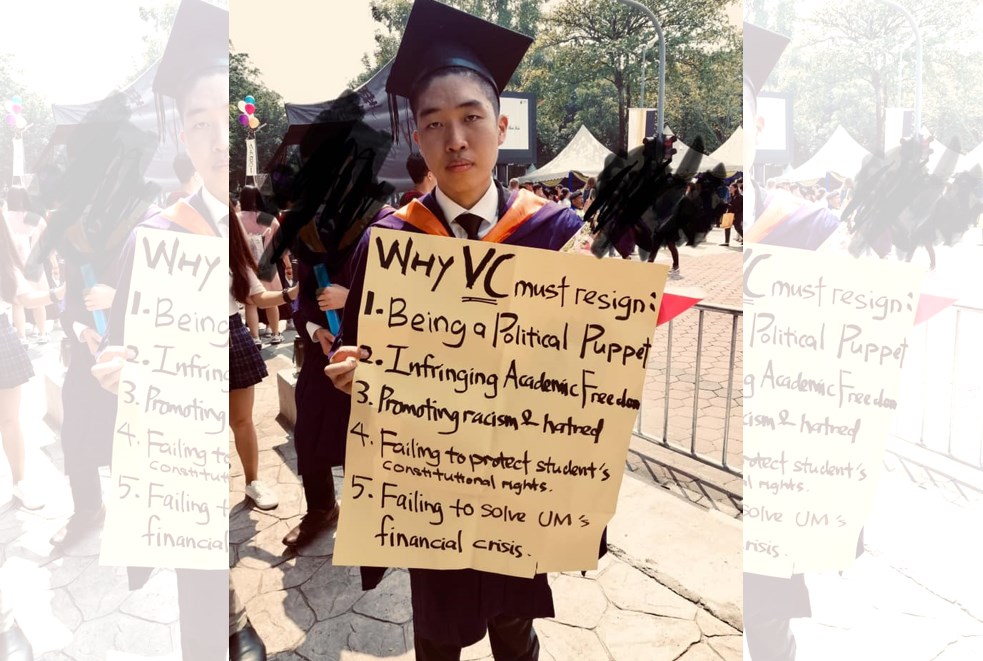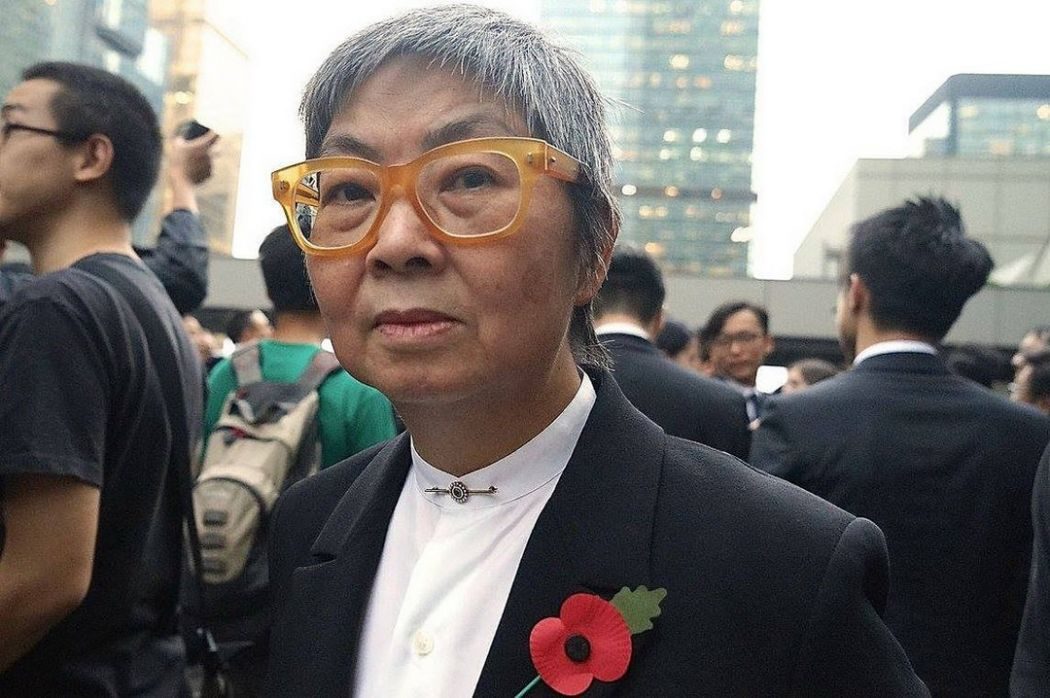By Daniel C. Tsang
A Malaysian university student activist who last year came to Hong Kong to show his solidarity with protesters here is facing two years’ imprisonment for disrupting his graduation ceremony.
Wong Yan Ke is an ethnic Chinese Malaysian 23-year-old, fluent in Putonghua and English. He had just graduated in civil engineering from Malaysia’s top university, the University of Malaya.

He has been charged under Malaysia’s Penal Code 504 with insulting the university’s vice-chancellor Abdul Rahim Hashim in order to cause a breach of the peace.
He faces up to two years’ imprisonment and a fine if convicted at an upcoming trial, with a case management hearing on Friday in Kuala Lumpur, according to Wong.
The then-graduating senior staged his protest last October after the vice-chancellor had addressed a nationalistic all-Malay congress eight days earlier. The official was seated near him as he shouted and unfurled a placard, that was almost immediately confiscated.
The placard just had two Malay hashtags: #TolakRasis (against racism) and #UndurVC (resign VC). He also yelled out in Malay: “This is Malaysian land!”
Outside the auditorium Wong, still decked in graduating cap and gown, held up a sign demanding the vice-chancellor resign for “promoting racism and hatred.”

Interviewed by a pro-democracy publication Malaysiakini, where he was tagged “the rebel in the spotlight,” Wong talked about the obstacles students face in his university: “The university practices a paternalistic management style. They see students from a top-down perspective and are never answerable to the students. They do not want us to raise questions.”
If Wong were just fighting for university students to have more rights, that would not have won him much attention outside Malaysia. But he and a fellow activist have worked hard to warn fellow Malaysians about the looming spectre of China’s authoritarian overreach, not just in Malaysia but in Hong Kong and Taiwan.
The second activist is Liew Liang Hong, two years older than Wong, and fluent in Cantonese, Putonghua and English. He was a student in Singapore, but was dissatisfied with his education there, and returned to Kuala Lumpur to continue his studies.
Since last June, Liew has organised several Hong Kong support rallies in Kuala Lumpur, joining the global solidarity movement with Hong Kong protests. Wong was an active participant.
The last such demonstration took place without the required ten-day notice to the police, who summoned Liew, the protest organiser, for questioning.
Liew, 25, a student in Chinese studies and who succeeded Wong as leader of the university new youth group, said that with protest actions so fluid in Hong Kong, it was impossible to plan solidarity actions in Kuala Lumpur ten days in advance.
The law governing public assemblies in Malaysia is, like the one in Hong Kong, a legacy of the colonial era under British rule. But by last year the situation in Malaysia had changed. Public assemblies no longer require prior police approval, as they do in Hong Kong, just notification.
However, although police monitored the Kuala Lumpur rally on September 29, and later asked Liew to report to the police station, no charges were brought against him for organising the rally.
Liew also visited Hong Kong last year, where he met Chinese University of Hong Kong Professor Chow Po-chung, who teaches political philosophy there, and local activist lawyer Margaret Ng.
Ng would this year be among the 15 pro-democracy activists arrested in Hong Kong. Chow had visited Kuala Lumpur and at Liew’s invitation, spoken to University of Malaya students.

Wong and other Malaysian Chinese activists converged on Hong Kong at the end of last September. Wong had an archetypal Hong Kong experience at a protest in Central: police teargassed him, despite his wearing a jacket identifying him in Chinese and English as press.
When I met Wong a few days after his commencement protest he was in good spirits, even amused that the university would raise such a fuss over his protest, something that is commonplace at graduation ceremonies in Hong Kong and elsewhere.
Although his comrade Liew escaped arrest for organising the Hong Kong support rally last September, fate caught up with Wong this past February, when he was charged in court.

He was quickly supported by the Malaysian office of ARTICLE 19, a well-known international civil liberties advocacy group.
Nalini Elumalai, ARTICLE 19’s Malaysia Programme Officer, issued a press release, “Malaysia: Drop charges against [the] activist for graduation protest.” It continued: “This is a clear attempt by the university to silence dissenting voices and to suppress the free speech of a former student.
“University officials should create an environment in which students can freely share their opinions without fear of censure. Their overreaction to an act of protest exposes their intolerance for criticism and willingness to abuse their position of authority.”
“The case against Wong Yan Ke is especially worrying in the context of the current political turmoil in Malaysia. Public officials have regularly dangled criminal charges in front of activists and ordinary citizens as a means of stifling protest and dissent. The government must make good on its promises and reform legal provisions, including those in the Penal Code, that unjustifiably restrict freedom of expression.”
Hong Kong activists Wong had befriended on his visits also came through in his support.
The Hong Kong Higher Institutions International Affairs Delegation, or HKIAD, made up of 11 student unions in higher education institutions in Hong Kong, released a joint statement with the National Taiwan University Student Association, expressing concern about the regime change in Malaysia and adding their support for Wong, calling his arrest “a sign of spreading white terror in Malaysia and a way to reinforce the regime’s absolute power…”.

The statement concludes: “Democracy, free election and human rights should be protected and recognised in Malaysia. Hongkongers and Taiwanese will always stand with Malaysians to fight for rights and liberty that we are born with.”
Wong, Liew and fellow Malaysian activists stood with Hong Kongers last year. It’s only right we stand with Malaysia this time.
Daniel C. Tsang is a Visiting Scholar at CUHK, Honorary Data Archivist at Hong Kong Public Opinion Research Institute, and Distinguished Librarian Emeritus at University of California, Irvine. He was born in Hong Kong.
